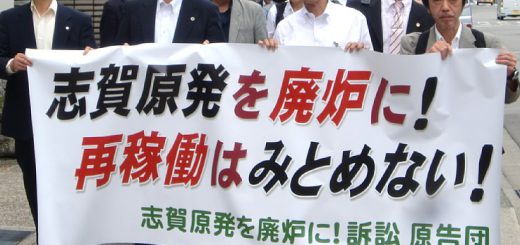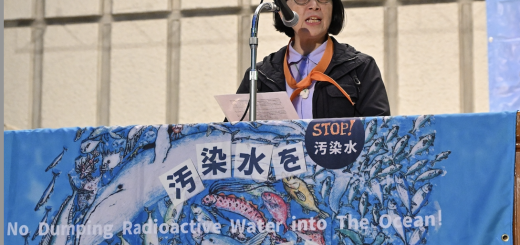Monju Restart: Appeal By Japanese Scientists
Press Release
March 23, 2010
Monju Restart: Appeal by Japanese Scientists
Japanese scientists concerned about the imminent restart of the Monju Prototype Fast Breeder Reactor issued a statement on March 11 this year. Citizens’ Nuclear Information Center (CNIC) translated their statement into English (see below).
Monju, owned by the Japan Atomic Energy Agency (JAEA), has not operated since a sodium leak and fire in December 1995.
On March 18 the Nuclear Safety Commission of Japan endorsed JAEA’s seismic safety report for Monju. The final requirement is for the governor of Fukui Prefecture to give the go ahead to restart the reactor. JAEA has said that it aims to restart the reactor before the end of the 2009 fiscal year (March 31), although there are some indications that this target might be missed.
Click here for a detailed discussion of Monju’s troubled history.
Contact
Hideyuki Ban (Co-Director), Tel: +81-3-3357-3800
Philip White (International Liaison Officer), Tel: +81-3-3357-3800
Japanese speaking reporters might also be interested in interviewing Dr. Keiji Kobayashi, former instructor at Kyoto University Research Reactor Institute and Monju expert. Please contact CNIC for his contact details.
Urgent Appeal: We Oppose the Restart of Monju
The Monju Fast Breeder Reactor (FBR, Tsuruga City, Fukui Prefecture) is scheduled to restart operations during March, after being shut down as a result of an accident over 14 years ago. There are almost no examples world-wide of reactors being restarted after such a long shut down, and there are no such examples for FBRs.
Monju’s owner, Japan Atomic Energy Agency (JAEA), claims that preparations are complete and the Nuclear Safety Commission (NSC) has approved the restart. However, hardly any checks of coolant system piping, tests to detect non-penetrating cracks and holes in the steam generator heat transfer tubes, or studies of the integrity of fuel assemblies in the reactor core have been undertaken, so there is no knowing what defects might be lurking.
In the course of preparations to restart Monju, it was discovered by accident, as a result of false alarms, that hundreds of contact-type sodium detectors had not been checked. Also, corrosion of the exhaust duct was left untreated. Problems such as these exposed the sloppy nature of the preparations and the restart date was extended on four occasions. There is no guarantee that other important checks have not been missed. Nor do we believe that organizational issues related to problem response, such as frequent late reporting, have been rectified. Many experienced people have left, giving rise to human resource problems. Under these circumstances it is dangerous to restart Monju. We believe there is a big risk of another accident.
Meanwhile, the cost of constructing Monju is 5 times that of a light water reactor. For this reason, a totally different concept from Monju is being proposed for practical implementation. Monju is, therefore, no longer a prototype leading to practical implementation of FBR. Since Monju is very different from the envisioned commercial plant, it has very little value in terms of the operational objective of “demonstrating its reliability as a power generating plant”. It can hardly be essential for “mastering sodium handling technology”. The experimental reactor Joyo already exists for the purpose of “fuel and material irradiation experiments”. Even from the perspective of promoting fast breeder reactors the restart of Monju has no meaning.
However, the most fundamental problems are that there is no prospect of commercializing fast breeder reactors anyway, and that by operating fast breeder reactors the most weapons-usable material, super-weapons-grade plutonium, can readily be produced and extracted.
Development of fast breeder reactors was begun before other types of reactors, in the hope that by breeding plutonium an inexhaustible resource for the generation of electricity would be obtained. However, development encountered huge problems and after half a century FBRs have yet to be commercialized. Leaders in FBR development, the USA, the UK, France and Germany, all withdrew 20 years ago. The reasons were: (1) FBRs are much more dangerous than light water reactors; (2) there is no prospect of FBRs being economically viable; and (3) there is the risk that FBRs can readily be linked to the production of nuclear weapons. Russian and Chinese reactors are fast reactors, which use enriched uranium fuel and are unsuitable for breeding plutonium. France’s new program is a part of its program for dealing with radioactive waste and is unrelated to breeder reactors. The only countries which still retain the objective of using FBRs for resource or military purposes are Japan and India. We do not believe that Japan alone can succeed in the uncertain technology development task of commercializing FBRs, not even over a period of several decades. In the midst of severe national financial circumstances, Japan is confronted with numerous urgent social problems. Continuing to waste huge amounts of taxpayers’ money year after year in order to operate the dangerous and meaningless Monju Fast Breeder Reactor is totally unacceptable.
For the above reasons, we strongly oppose the restart of Monju.
March 11, 2010
Signed by concerned scientists opposed to the restart of Monju
Noriko Aikawa (formerly of Toyama University)
Eiichi Arai (Emeritus Professor of Tokyo Institute of Technology)
Kota Baba (formerly of Hiroshima Shudo University, Faculty of Human Environmental Studies)
Toru Ebisawa (formerly of Kyoto University Research Reactor Institute)
Iwane Fujii (Emeritus Professor of Meiji University)
Yo Fujimura (Kanagawa Institute of Technology)
Yukou Fujita (formerly of Keio University)
Takeo Hashizume (Kagoshima University)
Tsutomu Hirose (formerly of Kumamoto University, Faculty of Engineering)
Hiroaki Hosokawa (Kyoto Seika University)
Tetsuji Imanaka (Kyoto University Research Reactor Institute)
Hiromitsu Ino (Emeritus Professor, Tokyo University, Faculty of Engineering)
Norio Ishida (Kyoto Gakuen University, Faculty of Bioenvironmental Science)
Shinji Kawano (Doshisha University, Faculty of Engineering)
Shigeru Kino (Ritsumeikan University)
Keiji Kobayashi (formerly of Kyoto University Research Reactor Institute)
Hiroaki Koide (Kyoto University Research Reactor Institute)
Hiroo Komura (Shizuoka University, Faculty of Engineering)
Hideyuki Koyama (formerly of Osaka Prefecture University, Faculty of Engineering)
Hiroshi Miwa (Emeritus Professor of Shinshu University)
Taisuke Miyauchi (Hokkaido University, Faculty of Human Sciences)
Mitsuhiko Ozaki (formerly of Osaka University, Faculty of Engineering)
Seung-Joon Park (Kyoto Sangyo University)
Kiichi Shiratori (formerly of Kyushu University, Faculty of Science)
Kenji Showaki (formerly of Kyoto University, Faculty of Engineering)
Atsushi Tsuchida (Meijo University)
Kousaku Yamada (formerly of Kyoto University, Faculty of Science)
Yukio Yamaguchi (Wako University)
Tomoya Yamauchi


